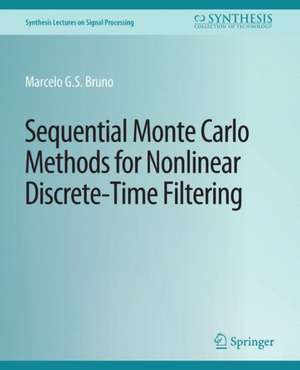Sequential Monte Carlo Methods for Nonlinear Discrete-Time Filtering: Synthesis Lectures on Signal Processing
Autor Marcelo G. S. Bruno, Marcelo G.S.en Limba Engleză Paperback – 28 ian 2013
Din seria Synthesis Lectures on Signal Processing
-
 Preț: 350.72 lei
Preț: 350.72 lei -
 Preț: 412.42 lei
Preț: 412.42 lei -
 Preț: 351.41 lei
Preț: 351.41 lei -
 Preț: 191.30 lei
Preț: 191.30 lei -
 Preț: 413.27 lei
Preț: 413.27 lei - 15%
 Preț: 594.24 lei
Preț: 594.24 lei -
 Preț: 387.59 lei
Preț: 387.59 lei -
 Preț: 260.18 lei
Preț: 260.18 lei -
 Preț: 259.04 lei
Preț: 259.04 lei -
 Preț: 415.57 lei
Preț: 415.57 lei -
 Preț: 247.72 lei
Preț: 247.72 lei -
 Preț: 191.30 lei
Preț: 191.30 lei -
 Preț: 360.50 lei
Preț: 360.50 lei -
 Preț: 387.96 lei
Preț: 387.96 lei -
 Preț: 234.87 lei
Preț: 234.87 lei -
 Preț: 351.41 lei
Preț: 351.41 lei -
 Preț: 388.52 lei
Preț: 388.52 lei -
 Preț: 427.88 lei
Preț: 427.88 lei -
 Preț: 267.31 lei
Preț: 267.31 lei
Preț: 234.87 lei
Nou
Puncte Express: 352
Preț estimativ în valută:
44.94€ • 47.05$ • 37.19£
44.94€ • 47.05$ • 37.19£
Carte tipărită la comandă
Livrare economică 02-08 aprilie
Preluare comenzi: 021 569.72.76
Specificații
ISBN-13: 9783031014079
ISBN-10: 3031014073
Ilustrații: XI, 87 p.
Dimensiuni: 191 x 235 mm
Editura: Springer International Publishing
Colecția Springer
Seria Synthesis Lectures on Signal Processing
Locul publicării:Cham, Switzerland
ISBN-10: 3031014073
Ilustrații: XI, 87 p.
Dimensiuni: 191 x 235 mm
Editura: Springer International Publishing
Colecția Springer
Seria Synthesis Lectures on Signal Processing
Locul publicării:Cham, Switzerland
Cuprins
Introduction.- Bayesian Estimation of Static Vectors.- The Stochastic Filtering Problem.- Sequential Monte Carlo Methods.- Sampling/Importance Resampling (SIR) Filter.- Importance Function Selection.- Markov Chain Monte Carlo Move Step.- Rao-Blackwellized Particle Filters.- Auxiliary Particle Filter.- Regularized Particle Filters.- Cooperative Filtering with Multiple Observers.- Application Examples.- Summary.
Notă biografică
Narayan Kovvali received the B.Tech. degree in electrical engineering from the Indian Institute of Technology, Kharagpur, India, in 2000, and the M.S. and Ph.D. degrees in electrical engineering from Duke University, Durham, North Carolina, in 2002 and 2005, respectively. In 2006, he joined the Department of Electrical Engineering at Arizona State University, Tempe, Arizona, as Assistant Research Scientist. He currently holds the position of Assistant Research Professor in the School of Electrical, Computer, and Energy Engineering at Arizona State University. His research interests include statistical signal processing, detection, estimation, stochastic filtering and tracking, Bayesian data analysis, multi-sensor data fusion, Monte Carlo methods, and scientific computing. Dr. Kovvali is a Senior Member of the IEEE.Mahesh Banavar is a post-doctoral researcher in the School of Electrical, Computer and Energy Engineering at Arizona State University. He received the B.E. degree in Telecommunications Engineering from Visvesvaraya Technological University, Karnataka, India, in 2005, and the M.S. and Ph.D. degrees in Electrical Engineering from Arizona State University in 2007 and 2010, respectively. His research area is Signal Processing and Communications, and he is specifically working on Wireless Communications and Sensor Networks. He is a member of MENSA and the Eta Kappa Nu honor society.Andreas Spanias is Professor in the School of Electrical, Computer, and Energy Engineering at Arizona State University (ASU). He is also the founder and director of the SenSIP Industry Consortium. His research interests are in the areas of adaptive signal processing, speech processing, and audio sensing. He and his student team developed the computer simulation software Java-DSP. He is author of two text books: Audio Processing and Coding by Wiley and DSP; An Interactive Approach. He served as Associate Editor of the IEEE Transactions on Signal Processing and as General Co-chair ofIEEE ICASSP-99. He also served as the IEEE Signal Processing Vice-President for Conferences. Andreas Spanias is co-recipient of the 2002 IEEE Donald G. Fink paper prize award and was elected Fellow of the IEEE in 2003. He served as Distinguished Lecturer for the IEEE Signal Processing Society in 2004.
